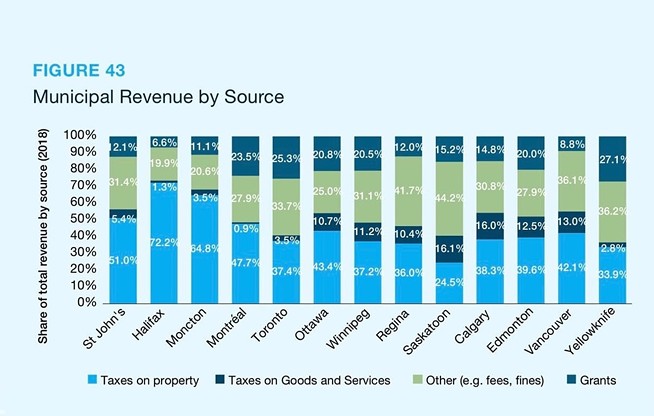The city’s Audit and Finance Committee got together Wednesday Jan. 17 for a pretty routine meeting.
First up, mayor Mike Savage brought forward a financial indicators report as an information item. In a bureaucratic rondelay, the HRM compiles information, sends it to the province, the province sends back this report and then the city can use the report to talk about its own finances. (In a temporal rondelay, since 2023’s report is not yet out, the report under discussion at this point in 2024 is from 2022.)
Except for Halifax’s infrastructure requiring a massive investment in the near future, things are looking okay-ish. But the report generated a bit of discussion when Savage pointed out the HRM is far too dependent on property tax as a source of revenue. He pointed to other cities that have property taxes making up about 40% of municipal revenue, compared to Halifax’s revenue split: As the following chart from the report shows, property taxes are over 72% of Halifax’s revenue.

This year is likely the year that Halifax joins most other landlords and raises the rent for short-term rentals. Currently in the HRM you can rent a hundred and fifty square feet of prime downtown real estate for free any weekend and evenings after 6pm. As long as you are wasting space downtown to store an empty car, the city lets you do that for free. There wasn't much debate on this today, this is more of a preview that user fees will likely feature heavily in this year's budget debates.
Also in this meeting the city’s audit team had its first meeting under the leadership of new municipal auditor general Andrew Atherton, who gave an update on the much-delayed fire inspection audit results. Most of the recommendations relate to a new way in which fire inspections will be done in the HRM, and possibly, in North America.
Essentially Halifax’s fire department is trying to come up with a system to do fire inspections that is dynamic and responsive to the risk of fire in the city. Extremely simplistically, a place with a higher risk requires more prevention attention, and the current inspection system doesn’t give the department enough flexibility to respond to changing risk conditions fast enough. When staff did a jurisdictional scan—looking at how other places deal with flexible inspection schedules—they found out that no one else was doing this, but everyone wanted to. So Halifax is developing a system and will likely be a pioneer in risk management and mitigation in the realm of fire inspection.
Councillor Paul Russell dragged himself off the Injured Reserve list to come in and make a motion to ensure the CAO follows up with this in three months. Hopefully he is now back in bed resting, where he will hopefully remain until he is better.
And finally the city’s investments are doing okay, under the new investment policy approved by council late last year. The new investment policy is divesting from corporations, and investing in banks. The city is also making more use of high interest savings accounts, as interest rates are high and it’s probably pretty easy for the city to keep $1,000 bucks in the account to avoid fees.
